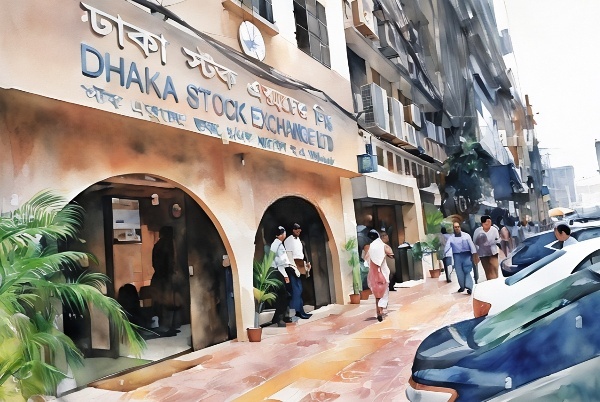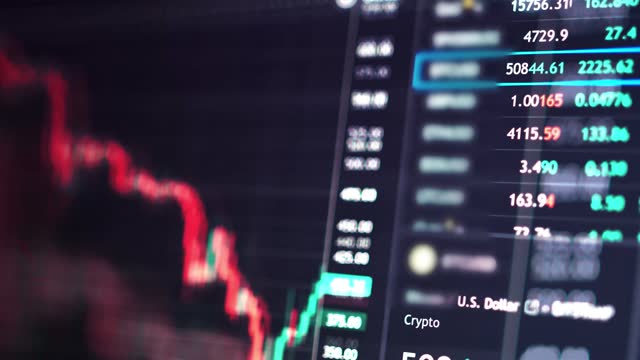Exodus from Bangladesh stock market: What's driving investors away?

Amidst a persistent decline in stock indices due to a prolonged economic crisis, a struggling banking sector, and rising interest and exchange rates, stock investors in Bangladesh are abandoning the market.
This trend is evident in data from Central Depository Bangladesh Ltd, which shows a 4% decrease in beneficiary owner accounts compared to the same period last year.
A combination of factors, including government policies, economic instability, and a loss of trust in regulatory oversight, has led investors to abandon the capital market.
Experts concerned say the market is not only facing unfavorable tax measures in the proposed budget and macroeconomic issues such as high inflation and dwindling foreign exchange reserves, but also a deep-seated lack of confidence in the market itself.
This lack of confidence is exacerbated by repeated interference from the securities regulator and its inability to control unscrupulous actors within the market.
Besides, since the removal of the floor price in January, large-cap stocks have experienced a continuous decline in value,regardless of the companies' financial performance.
This has led to the Dhaka Stock Exchange's prime index reaching a 39-month low, with a significant loss in market value. Blue-chip stocks have been particularly affected, falling to a 41-month low.
Interestingly, investor confidence in Bangladesh is waning at a time when stock markets in countries like the United States, Germany, India, and even crisis-stricken Pakistan are experiencing significant gains.

The Dow Jones industrial average recently
surpassed 40,000 points for the first time, while Germany's benchmark index
exceeded 18,000 points despite economic challenges.
India's Nifty 50 and BSE Sensex indices also witnessed substantial growth, while Pakistan's benchmark index reached a record high.
Stagnant investment and declining portfolios
Investors in Bangladesh’s capital market have already made it clear they won't tolerate interference in their asset management, leading to their exodus.
Several market analysts believe that many investors, primarily service-holders seeking supplementary income, are losing interest in the market due to stagnant investments and declining portfolio values.
In addition to declining investor numbers, listed companies' dividend payouts have also fallen over the past two years.
This is due to reduced profits caused by rising expenses, a weakening currency, and increased funding costs. Surprisingly, investors in well-performing stocks are experiencing greater losses compared to those who invested in less reputable companies.
The calculation of the DSEX index excludes several large-cap stocks like Walton, IDLC, and Crown Cement due to their low free-floating shares during the period when floor prices were implemented.
The broader market index would have suffered even greater losses in the past two months if major stocks like the stocks of those above-mentioned companies, which experienced significant declines, were factored into the calculation.
Currently, only 257 out of the 378 companies listed on the Dhaka Stock Exchange are included in the DSEX index calculation.
The overall market decline, however, doesn't fully reflect the investors' true suffering.

Speculative bubble that got burst
The DSEX index has fallen below the levels seen in July 2022 when the BSEC reintroduced the floor price, suggesting that the measure was ultimately ineffective and even harmful to investors.
While large-cap stocks were artificially held at floor prices, small-cap stocks experienced a speculative surge, attracting inexperienced investors with the promise of quick profits.
Besides, regulatory inaction in addressing artificial stock price hikes and brokerage firm embezzlement has left investors feeling cheated and disillusioned.
Ahsan H. Mansur of the Policy Research Institute of Bangladesh attributes the loss of investor confidence to the imposition of floor prices and the regulator's failure to curb market manipulation.
He questions the motives behind this rally and the lack of regulatory action against those who manipulated the market.
“This lax oversight has contributed significantly to the current state of the market,” Mansur said, adding that as a result,investors are hesitant to invest even in blue-chip stocks like Grameenphone, BAT Bangladesh, and Walton, despite their historically low prices.
Additionally, the FY25 budget further dampened market sentiment.
Economist Zaid Bakht noted the lack of expected stimulus measures and the introduction of capital gain tax for individual investors with profits exceeding Tk 5 million as factors contributing to negative investor reactions.
Saiful Islam, president of the DSE Brokers Association of Bangladesh, agreed, stating that while not opposed to the tax in principle, the timing is inappropriate and has intensified negative sentiment.
Md Saifuddin, managing director and CEO of IDLC Securities, attributes the declining interest in stocks to rising interest rates in the banking sector and the high exchange rate.
He points out that the recent removal of the SMART formula and the lending rate cap, along with the surge in treasury bill interest rates to a record 12%, have made bank deposits and treasury investments more attractive for investors.
“As a result, investors are shifting their funds away from the stock market, which lacks the necessary components to entice them,” he told Bangla Outlook.
—-

